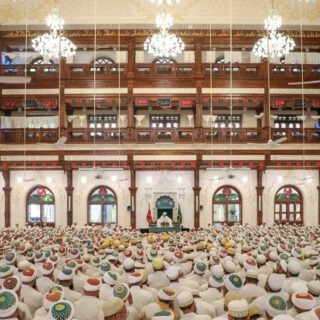In the last issue we talked about the greeting culture among Mumineen saying, “السلام عليكم ورحمة الله وبركاته” while doing salaam. In the light of Rasulullah SAW’s hadith sharif,
المؤمن اخو المؤمن (A Mumin is a brother of a Mumin)
Another element of Fatemi culture is the habit of addressing and calling each other by saying “BHAI”, like Taher bhai, Mohammed Bhai, Mufaddal bhai and so on.
Lisan al-Dawat is a respectful language wherein we address each other saying, “tame” or “aap.” Saying “تو (to)” to anyone, even if younger than us, is deemed disrespectful. Highlighting this aspect of respect in addressing each other with “bhai”, Syedna Aali Qadr Mufaddal Saifuddin TUS once said,
“Mumineen of Surat have a habit of prefixing the names with “bhai.” They say, “Bhai Hatim”, “Bhai Taher”, “Bhai Nooruddin.” Addressing one with his first name (without saying “bhai”) seems disrespectful; like saying, “Hatim”, and “Taher.” One should refrain from such a form of address and instead, say, “Taher Bhai”, “Hatim Bhai”, “Husain Bhai.”
Further, Syedna al-Dai al-Ajal TUS stresses this directive with the historical instance of the amal sharif of al-Dai al-Ajal Syedna Taher SaifuddinRA:
“Many of our elders have witnessed Maulana Taher Saifuddin RA addressing (Maulana Mohammed BurhanuddinRA) as, “Bhai Burhanuddin! Bhai Burhanuddin!” The sweetness with which he spoke these words is indescribable.”
Our young ones imitate our words and actions. Hence, utmost care should be taken in the selection of words while talking to them or conversing with others in their presence. Even young ones have their self-esteem. When they are addressed as elders, they feel proud and their self-respect gets heightened.
Self-esteem is similar to self-worth. This can change from day to day or from year to year, but overall self-esteem tends to develop from infancy and keeps going until we are adults. Healthy self-esteem is like a child’s armour against the challenges of the world. Kids with high self-esteem feel good about themselves and seem to have an easier time handling conflicts and resisting negative pressures. Kids can be sensitive to parents’ and others’ words. Nurture your own self-esteem and they’ll have a great role model.
The author of Rasaail Ikhwaan al-Safaa’, Maulana Imam Ahmed al-Mastoor AS has throughout his epistles addressed the reader saying, “Know! O my Brother!”
Al-Dai al-Ajal Syedna Abdeali Saifuddin RA has addressed his young shahzadah al-Dai al-Ajal Syedna Mohammed Badruddin RA with these words, which each one of us knows:
كيكا بهائي جلدي ثثرٌهو
Al-Dai al-Ajal Syedna Taher Saifuddin RA has addressed Mumineen in the opening verse of his popular naseehat with:
برادر تو نصيحة سن
It is narrated that Dai Abi Abdillah RA used to address Mumineen with “Yaa Akhaanaa”, meaning “O our brother!” Mumineen of his time followed his example and addressed each other as “Yaa Akhaanaa!”
We have heard Syedna Mohammed Burhanuddin RA and Syedna Aali Qadr Mufaddal Saifuddin TUS addressing us from takht-e-imaami with “Biraadaro! Bhaiyo!”
The impact of this respectful language is such that when we call our colleagues “bhai” or “behen”, ill-feelings and hostility for each other get washed away from our hearts. A spirit of oneness prevails and all differences and disparities are erased, a family-like bond is created. Pointing to this ultimate stage of oneness Syedna Mohammed Burhanuddin RA explained the meaning of the following Quranic verse:
اخوانا على سرر متقابلين
And we will remove from their hearts any deep feeling of bitterness (that they may have), (so they will be like) brothers facing each other on thrones.
(Mumineen are like brothers) have one religion and belong to one family. Hence, they call each other “bhai”-“mumin bhai”. They all gather in one majlis, with no difference among them.”
May Allah protect Fatemi Thaqaafat in our generations. Saying “Labbayka Ya Da’iyallah” to the divine call of Syedna Aali Qadr Mufaddal Saifuddin TUS may we gather in the majaalis of Asharah Mubarakah as one. May Allah grant Syedna al-Dai al-Ajal TUS, the custodian of Fatemi Thaqaafat a long life till the day of Qiyaamat.








